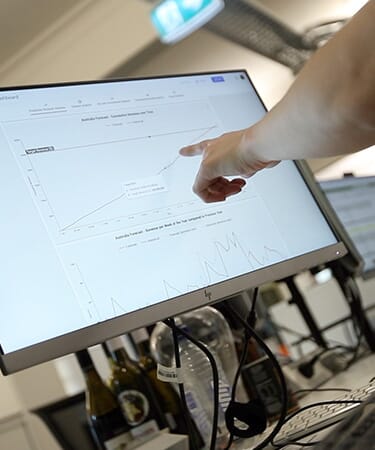Google Optimize is scheduled to sunset in September of this year, so make sure you’re not caught in the dark.
Our Head of Experience, Myles Humphrey takes a look into what marketers can do once Google Optimize discontinues, and the alternative options available.

Let’s face it. None of us like it when someone or something we’ve been heavily dependent on, disappears from our lives. Given that the Google suite is in almost every marketer’s toolbox, Google Optimize is an easy add-on for marketers to use. Optimize is one of the most popular testing tools, which is provided by Google, aimed to help marketing teams increase their conversion rates and overall user experience.
When Google Optimize discontinues on 30 September, businesses reliant on the platform will need to have an alternative lined up, if they wish to continue testing variants on their website and tailor their website experiences to fit individual audience criteria.
However, choosing an alternative platform may be a challenge for many marketers. Firstly, they will have to figure out the business value of Google Optimize, and then must decide whether it is more profitable to pay for an alternative option, or to go without testing all together.
With so many options available, and the switch on the horizon, how can marketers decide their next move? We spoke with our head of experience, Myles Humphrey to find out.
In this article, we will discuss:
What are the best alternatives to Google Optimize?
If you have already decided that finding a replacement service to Google Optimize is for you, thankfully alternatives to Google Optimize have been growing in number and sophistication - meaning whatever your budget, there’s an option.
AB Tasty markets itself as, “is a reasonably priced, simple-to-use tool that serves as a good tool for those with straightforward optimisation needs”.
Meanwhile, VWO “is a top choice for businesses with slightly smaller budgets and popular amongst many marketers”, while Optimizely is an experimentation and personalisation platform aimed at enterprise customers.
To get a more in depth dive into the difference of each tool, we've compiled a CRO experimentation matrix to make it easy to compare alternative providers side-by-side.
Compare the Best CRO Testing Tools with The CRO Experimentation Matrix
We've created The Conversion Rate Optimisation (CRO) Experimentation Matrix, a comparison tool for marketers to easily compare vendors across the complex landscape.
You’ll be able to easily review features across DXPs and CRO platforms to understand what each platform is, its capabilities and where you should invest your CRO dollars.
Unique window to prove that CRO is for you
Google Optimize represents the chance for marketers to test out if CRO is really for them before having to invest in a full platform – but time is running out.
While there are a few rumours of free offerings around from providers such as VWO, they will have limited functionality. And so a well organised, results focused campaign using Google Optimize campaign before September 30 is a great plan.
Humphrey said that “We have seen 2 groups in our consultancy on alternative platforms to date – those who have an established testing program underway and just want to find the best fit alternative – and those who are seizing the chance to build the business case for CRO programs and investment in a paid platform while free Google Optimize still exists.
For the second group, given the finite amount of time left and the pressure for success, our CRO team have been working closely with passionate clients teams to set programs up with our CRO established processes of audit, prioritisation and execution. Utilising our in-house test building developers and support team to get the scale, results and ultimately build the business case for investment in platforms before Google Optimize leaves us on September 30th.”
In an online world, conversion matters
When it comes to increasing profit, optimising conversion can give marketers an easy win. Research by HubSpot shows that increasing conversion by as little as one per cent could lead to an uplift in the bottom line.
Despite the easy gains, marketing spend is still heavily skewed towards obtaining traffic. In fact, marketers spend a whopping 92x more on getting traffic than they do on converting traffic to customers.
Whilst Google Optimize is a valuable tool in testing your hypothesis around what changes may increase conversion, other tools that can give a much more holistic insight into what is and isn’t working on your website.
Our conversion audit uses quantitative and qualitative data to give you a clear insight into how consumers are behaving on your site.

Personalisation can lead to rapid conversion
Personalisation is another tool that can significantly drive website gains – the smallest change to personalise a Call To Action (CTA) button could help convert around 42 per cent more prospects, according to HubSpot.
Despite the importance of personalisation being well known, 34% of marketers interviewed in the Navigating The MarTech Landscape 2023 report, didn’t have any personalisation in place.
The largest group (at 41 per cent) had ‘basic’ personalisation which means they have static information such as name or location and just 8 per cent had the holy grail – personalisation delivered across channels using a single view of customer and interactions.
With these strategies in place, you can ensure that your bottom line survives the end of Google Optimize.
Press coverage: B&T










